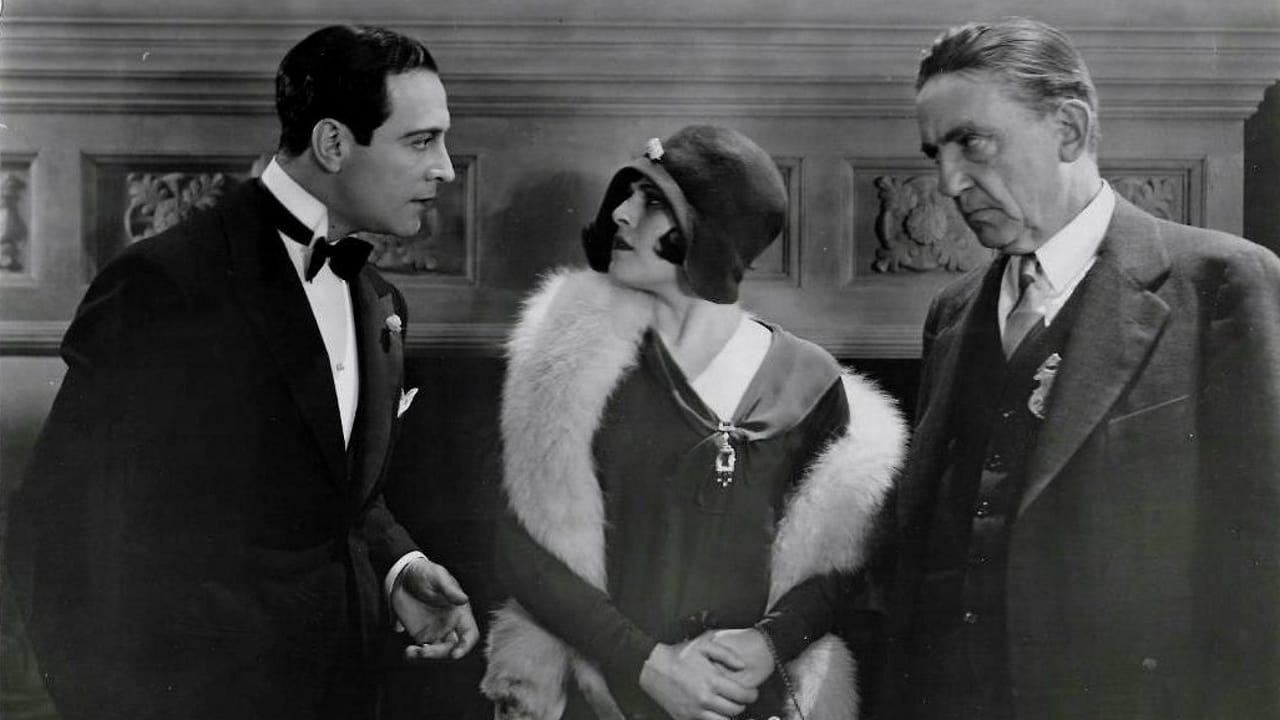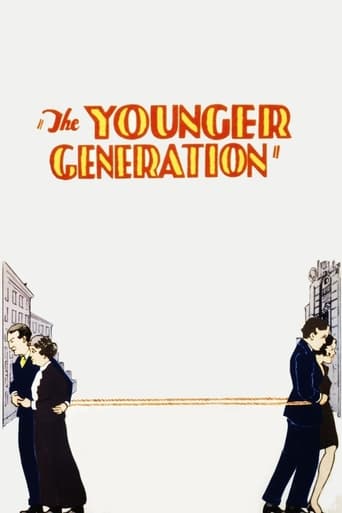

A Disappointing Continuation
... View MoreThis movie was so-so. It had it's moments, but wasn't the greatest.
... View MoreFanciful, disturbing, and wildly original, it announces the arrival of a fresh, bold voice in American cinema.
... View MoreI think this is a new genre that they're all sort of working their way through it and haven't got all the kinks worked out yet but it's a genre that works for me.
... View MoreTHE YOUNGER GENERATION is a transitional film. In other words, it was originally a silent film but with the advent of sound in 1927, like many films in production it was held from release and hastily converted to sound. In some cases, such films were crudely overdubbed or all new scenes were added. Now it should be noted that most of these films were NOT 100% sound films, but bits and pieces of sound dialog were added here and there. This is even true to the groundbreaking 'sound' film, THE JAZZ SINGER--as most of the movie actually was still silent. By 1930, such practices were over in the US and films all films were 100% sound (with a few very rare exceptions, such as Chaplin's CITY LIGHTS). Interestingly, this conversion took many more years to take place throughout the rest of the world--with silents still predominating in China and Japan until the late 1930s.This is an interesting film because it's one of the few times in which leading man Ricardo Cortez played a Jewish man. This is interesting because although he had a Hispanic name, this was not his real name--and he was, in fact, Jacob Krantz--Jewish through and through. I guess the studio thought it best, but it seems sad that he publicly pretended to be something he wasn't. But, back in the 1920s and 30s, being a Jew certainly was NOT an asset for a handsome leading man.In addition to Cortez, the other interesting star in the film is Jean Hersholt. While this very prolific character actor may not be a household name, the Oscar's special award for community service was named after him, the Hersholt Humanitarian Award--as Hersholt was the man responsible for the creation of the actor's retirement home and hospital (among other such work).The film is in some ways like a reworking of the recent hit, THE JAZZ SINGER. Like the JAZZ SINGER, this story involves a Jewish family and a son who violates tradition--much to the consternation of his father. In this case, Cortez becomes very successful in business and thinks that this means his family should pretend that their ethnic history does not exist. In other words, Cortez wants to be accepted by the rich folk and to do so, he wants to abandon his heritage--and changes his name from 'Goldfish' to 'Fish' (a common practice among assimilating Jews during this era). While he does bring his family with him to his new 5th Avenue home, he won't allow them to bring in their old friends and insists they act like rich Gentiles. He even drives his sister's boyfriend off as he's no longer 'acceptable'. While this is bad, it's made much worse because in addition to becoming a snob, Cortez really becomes a nasty jerk as well and it's really, really easy to hate him--especially when it comes to his treatment of his sister. Will Cortez see the light? Will his family continue to put up with the prison-like life he's given them? Will they finally just punch him in the schnoz and say "enough's enough"?! Tune in for yourself and see--though I'll let you know that Cortez' treatment of his parents becomes abominable...and rather heartbreaking.Overall, it is very well done and is a wonderful little portrait of an America that no longer exists--the first and second generation Jewish immigrants. Now, much more fully integrated into the society, the Lower East Side is no longer Jewish and the tough life you see them leading is a bygone era. For history and social studies teachers and students, this is an excellent film--and better than its predecessor, THE JAZZ SINGER--even if it is awfully similar.By the way, in many of these partly sound films, you may notice that the silent portions seem to move too fast. That's because silent films had no standard speed at which to run them (which varied from 16-22 frames per second) and sound always ran at 24 frames per second. So, when a silent portion is run through a sound projector, it is slightly sped up--giving it an odd sped-up look. The only times you don't see this is when quality VHS and DVD releases have the speed adjusted to the proper rate.
... View MoreThis film is one of the rare surviving goat gland films, that is, it's a part talkie. The film was made in 1929, and although more financially or technically advanced studios had graduated to all-talking pictures by now, poverty row Columbia was just beginning to work with the new technology. As a result, the film is split rather oddly into silent and talking portions, and it goes back and forth between talking and silent throughout the picture. However, it is very well done in spite of this. They must have had some trouble with synchronization, because often the speaking portions will have the speaker turn his/her back to the camera so you can't see that the sound is out of sync. Also, there is a song performed at a distance in which you can clearly see that the singer's lips and the song are out of sync.Enough about the poverty row qualifications. The film itself is an excellent Frank Capra work about a Jewish family in a poorer section of New York City. Don't expect the optimistic Capra of later years here, though. The film is surprisingly downbeat although the Capra themes of the importance of family and the evils of chasing riches for riches sake shine through.The film opens with Julius Goldfish (Jean Hersholt) selling from his push-cart. Actually, he's loafing and talking with friends and ignoring the push-cart. His wife Tilda (Rosa Rosanova) scolds him about his loafing and says he'll never get ahead. Meanwhile their children do not get along with each other. Morris, their son, is always looking for ways to make money, even salvaging stuff from a burning building in order to have a fire sale. Birdie Goldfish (as an adult, Lina Basquette) and Eddie Lesser (as an adult, Rex Lease) are childhood sweethearts. Ma Goldfish is always building up Morris' industry and ingenuity, and Birdie is Pa Goldfish's pride and joy, although Ma and Pa love both children.Time passes, and the adult Morris (Ricardo Cortez) builds up the push-cart into a thriving antique business and moves the entire family to Fifth Avenue, not so much because he wants his family with him, but because you feel he would be embarrassed to have it known that his family is living on the East Side. Morris even changes his name to Fish to leave his Jewish roots behind and be accepted in the gentile social circles of upper crust New York City. To this end he tries to control the lives of his parents and his grown sister, even shooting disapproving looks at his dad whenever he wears his prayer shawl. Eventually Morris turns his parents into museum pieces and pushes his sister out of the family when her marriage to Eddie embarrasses him socially. The end is bitter-sweet with a final scene that is hard to forget.Highly recommended as a touching dawn of sound film and a showcase of Capra's talents during this technologically challenging era when so many others were making either stiffly acted static dramas or ludicrous musicals in this transitional year of all-talking pictures.
... View MoreTrue this is not a typical Capra film as has been noted, but his hand is all over this thing. One has to keep in mind how early this was in Capra's career. It has the main elements usually found in his films, especially the lessons about what really matters in life. Papa Goldfish was not a successful man financially like his son was, but the reunion on the street when he goes back to his old neighborhood was very telling --- and touching. Other touching moments include not just Birdie's getting to see him before he dies, but also Papa's asking her, "Did you know I'm a Grandpa?" She runs to get the baby for him to see and lets the baby play on the bed next to him. Papa even asks the baby "Ain't you surprised I'm a Grandpa?" These, among many others, are all Capra touches. About the only thing missing was the villain managing to repent. But Capra's villains did not always mend their ways. Here the main difference was that it was the protagonist's own son who manages to muck things up. It's a good little film and I think Frank Capra fans will enjoy seeing his early work.
... View MoreNot a typical Capra film by any means (and one that will undoubtedly disappoint even his most steadfast fans), this Columbia part-talkie (copyright 18 March 1929) comes over as a film noir in every sense of the word. The overall mood is decidedly black. Despite the melodramatic story (the heroine's husband, played by Rex Lease, gives himself up to the police instead of seeing a good lawyer who could easily have induced a judge to dismiss the main charge and simply impose a fine for staging a street concert without a license), Capra and his slow-moving players act it out in an overwhelmingly realistic manner. The conclusion is one of the most depressingly downbeat ever! Nonetheless, the film offers a rare chance to see the legendary Lina Basquette at her zenith. Jean Hersholt enthusiasts will not be disappointed either, although I thought he way overdid the schmaltz. The player who came off best, in my opinion, was ever-reliable Ricardo Cortez, who not only succeeded in being perfectly reprehensible but added more than a touch of sympathy to his characterization. At the final curtain, when I saw him, back to the camera, sitting alone in front of the ornate fireplace in his huge but now empty home, I couldn't help but feel overwhelmingly sorry for him.
... View More